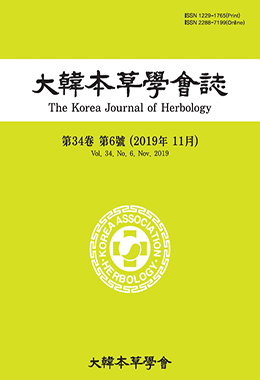Objective : Gastritis is a major complication of gastrointestinal disease. Lonicera japonica is used in folk medicine to treat different diseases such as exopathogenic wind-heat, epidemic febrile diseases, sores, carbuncles and some infectious diseases. Therefore, this study examined the effects of Lonicera japonica water extract (LJE) on HCl/ethanolinduced acute gastric ulceration and anti-oxidants properties.
Methods : LC-ESI-IT-TOF MS was employed for rapid identification of major compound from LJE. The antioxidant activities were evaluated through total polyphenol and flavonoid contents and radical scavenging assays and superoxide dismutase (SOD)-like activity. SD rats were randomly divided into five different groups including the normal group, ulcer group, positive group (20 ㎏/㎎ of omeprazole, ip), and experimental groups (100 ㎏/㎎ and 500 ㎏/㎎ of LJE, ip).
Results : 4,5-Dicaffeoyl quinic acid, loganic acid, secologanic acid, sweroside, loganin, vogeloside were identified based on the detection of the molecular ion with those of literature data. The LJE was possessed free radical scavenging activities such as DPPH (IC50=189.7 ㎍/㎖), ABTS (IC50=164.5 ㎍/㎖), and SOD-like activity (IC50=405.02 ㎍/㎖). Macroscopic and histological analyses showed LJE treated group were significantly reduced to an extent that it allowed leukocytes penetration of the gastric walls compared with the ulcer group. In addition, an ulcer inhibition rate and prostaglandin E2 levels were increased in rats treated with LJE.
Conclusion : The present study has demonstrated the antioxidantive and gastroprotective effect of LJE, these findings suggested that LJE has the potential for use in treatment of gastric disorders.


